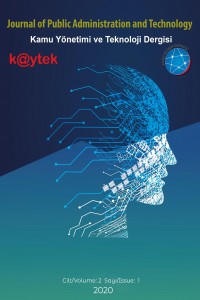Abstract
Bu makalenin ana teması, “dijital çağda kamu yönetimi” yapılanmasına nitelikli personel yetiştirecek kamu yönetimi lisans müfredatlarının bilgi ve iletişim teknolojilerindeki gelişimlerden hangi oranda etkilendiklerinin tespit edilmesidir. Çalışmada ilk olarak kamu yönetimi hizmet sunumunda kullanılan bilgi ve iletişim teknolojilerinin kavramsal çerçevesi çizilecektir. Sonraki bölümlerde ise Türkiye’de kamu yönetimi eğitimi veren lisans müfredatları “Bologna Bilgi Paketleri” nin yer aldığı üniversite internet siteleri üzerinden analiz edilerek, müfredatlarda hangi ölçüde bilgi ve iletişim teknolojilerindeki gelişmelere yer verildiği tespit edilecektir. Sonuçta bu çalışma, dijital çağda kamu yönetimi eğitimi veren lisans müfredatlarının teknolojik gelişmelerden etkilenme oranları hakkında genel bir perspektif çizmeyi amaçlamaktadır.
References
- Albrecht,S and others..(2008). eParticipation – Electronic Participation of Citizens and the Business Community in eGovernment. Bremen: Institut für Informationsmanagement Bremen GmbH.
- Anthopoulos, L. G. (2017). Understanding Smart Cities: A Tool for Smart Government or an Industrial Trick?. Cham: Springer International Publishing AG.
- Baş, C. (2017). Avrupa Kentsel Şartı. Ankara, Türkiye Belediyeler Birliği.
- Bolívar, M. and Pedro R. (2014). Measuring E-government Efficiency The Opinions of Public Administrators and Other Stakeholders. New York: Springer Science+Business Media.
- Bunch, B. and Hellemans, A. (2004). The History of Science and Technology. New York, Houghton Mifflin Company.
- Babaoğlu, C. ve Demircioğlu, M. A. (2012). “Türkiye Kamu Yönetimi Bölümlerinde E-devlet Derslerinin Durumu” iç. E-devlet, (Edt: Zahid Sobaci ve Mete Yıldız), Nobel, Ankara, s: 129-153.
- Okçu, M., Parlak, B., & Akman, E. (2015). “Kamu Yönetimi Eğitimi, Geçmişten Geleceğe Küresel ve Ulusal Perspektif” iç. Kamu Yönetimi Eğitimi ve Öğretimi Literatürü Üzerine Bir Çözümleme. Ekin Yayınevi, s. 3-24
- Davies, R. (2015). eGovernment Using technology to improve public services and democratic participation. Avrupa Birliği: Directorate-General for Parliamentary Research Services, European Parliament Members' Research Service.
- Desouza, K. C. (2018). Delivering Artificial Intelligence in Government: Challenges and Opportunities. Washington: IBM Center for The Business of Government.
- E-Government in Denmark (2015). Avrupa Birliği: ISA Editorial Team, Kurt Salmon S.A.
- E-Government in Local and Regional Administrations Guidance, Tools and Funding for Implemantation (2017). Avrupa Birliği: The Publications Office of the European Union.
- E-Government in United Kingdom (2014). Avrupa Birliği: European Dynamics SA.
- E-Government Master Plan 2011-2015 Collaborative Government. Singapur, Info-communications Development Authority of Singapore.
- Elizabeth C. (2005) Searching for Science, Journal of Electronic Resources in Medical Libraries, 2:2, 35-47.
- Ha, H. and Coghill, K. (2008). E-government in Singapore - A SWOT and PEST analysis. Asia-Pacific Social Science Review. Volume 6.
- Hello, World: Artificial Intelligence and its use in the Public Sector (2019). The OECD Observatory of Public Sector Innovation.
- Henden, B. H. ve Henden R. (2005). Elektronik Sosyal Bilimler Dergisi www.e-sosder.com ISSN:1304-0278 Güz 2005 C.4 S.14 (48-66)
- Hernon, P. and Others (2002). United States Government Information Policies and Sources. Westport, Libraries Unlimited.
- Huang, W. ; Siau, K. ve Wei, K. K. (2005). Electronic Government Strategies and Implementations. Londra, Idea Group Publishing.
- Ke, W. (2004). Successful E-Government in Singapore. Communications of the ACM. 47. 95-99
- Kondepudi, S. and Others (2014). Smart sustainable cities: An analysis of definitions. Cenevre: International Telecommunication Union.
- Leblebici, D. Ve diğerleri (2003). Polis Bilgi Sistemlerinin Etkililiği Üzerine Bir Değerlendirme, 1. Polis Bilişim Sempozyumu Bildiriler Kitabı, Emniyet Genel Müdürlüğü Yayın Katalog:280, Ankara
- McClellan, J. E. ve Dorn, H. (2006). Science and Technology in World History. Baltimore, The Johns Hopkins University Press.
- Mehr, H. (2017). Artificial Intelligence for Citizen Services and Government. Cambridge, Ash Center for Democratic Governance and Innovation Harvard Kennedy School. Miller, H. and Stirling, R. (2019). Government Artificial Intelligence Readiness Index 2019. Moon, M. J. (2002). The Evolution of E-Government among Municipalities: Rhetoric or Reality?. Public Administration Review, Vol. 62, No. 4 (Jul. - Aug., 2002), pp. 424-433. Öktem, M. K. ve Aydın, M. D. (2005). Bilgi Teknojileri ve Türk Kamu Yönetiminde Dönüşüm. Hacettepe Üniversitesi İİBF Dergisi, Cilt 23, Sayı 1, s. 257-282 Polat, Karakaya R. (2006). E-Belediyecilik Kılavuzu Yerel Yönetim Vatandaş Etkileşimi. İstanbul, Tasam Yayınları.
- Rethinking e-Government Services User-Centred Approaches (2009). Paris, OECD Publishing.
- Smart Cities Preliminary Report 2014 (2014). Cenevre, ISO Copyright Office.
- Uçkan, Özgür (2003), E-Devlet, E-Demokrasi ve Türkiye. İstanbul, Literatür Yayıncılık.
- Unleashing the potential of Artificial Intelligence in the Public Sector (2017). Capgemini Consulting.
- Wohlers, T. E. ve Bernier L. L. (2012). Setting Sail into the Age of Digital Local Government Trends and Best Practices. New York, Springer Science+Business Media.
- Yaman, M. (2018). Belediyelerin Sosyal Medyadan Faydalanma Biçimleri: Kütahya İli Ve İlçe Belediyeleri İçerik Analizi, Dicle Sosyal Bilimler Enstitüsü Dergisi, ISSN: 13086219, Yıl 10, Sayı 20, s.224-243
- İNTERNET SİTELERİ
- URL-1 (2019). https://www.gov.uk/performance/site-activity/site-traffic#from=2016-01-01T00:00:00Z&to=2019-12-01T00:00:00Z
- URL-2 (2019). https://www2.deloitte.com/us/en/insights/focus/cognitive-technologies/artificial-intelligence-government.html
- URL-3 (2019). https://www.usa.gov/history-of-website
- URL-4, (2019). https://cbddo.gov.tr/hakkimizda/
- URL-5, (2019). https://www.turkiye.gov.tr
- URL-6, (2019). https://www.aa.com.tr/tr/turkiye/e-devlette-kullanici-sayisi-44-5-milyonu-gecti-/1647759
- URL-7, (2019).https://www.aa.com.tr/tr/turkiye/altun-cimer-devrimini-yazdi/1662251
- URL-8, (2019). https://ec.europa.eu/info/eu-regional-and-urban-development/topics/cities-and-urban-development/city-initiatives/smart-cities_en
- URL-9, (2019). http://www.bbc.com/autos/story/20141202-in-the-netherlands-a-luminous-highway
- URL-10, (2019). https://smartcities-infosystem.eu/sites-projects/projects/cityfied
- URL-11, (2019). https://smartcities-infosystem.eu/sites-projects/projects/storm
Details
| Primary Language | Turkish |
|---|---|
| Journal Section | Articles |
| Authors | |
| Publication Date | July 15, 2020 |
| Published in Issue | Year 2020 Volume: 2 Issue: 1 |

